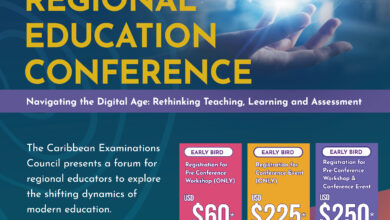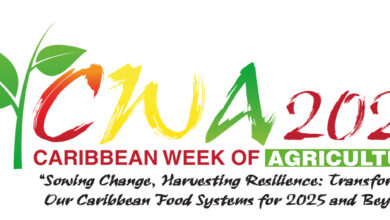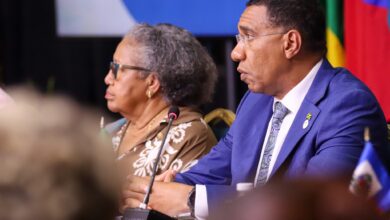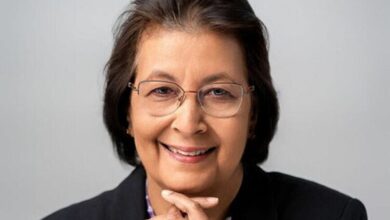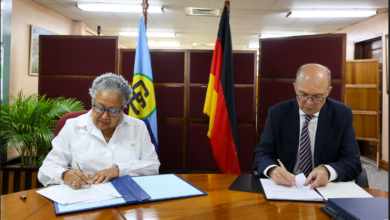The Ninth Inter-Sessional Meeting of the Conference of Heads of Government of the Caribbean Community (CARICOM) was held in St. George’s, Grenada, from 2 to 3 March 1998.
Heads of Government in attendance were: Hon. Lester B. Bird, Prime Minister and Minister of Foreign Affairs, Planning, Social Services and Information, Antigua and Barbuda; Rt. Hon. Hubert Ingraham, Prime Minister of the Commonwealth of The Bahamas; Rt. Hon. Owen Arthur, Prime Minister and Minister of Finance and Economic Development, Barbados; Rt. Hon Manuel Esquivel, Prime Minister and Minister of Finance and Economic Development, Belize; the Hon. Edison James, Prime Minister and Minister of Foreign Affairs, Legal Affairs and Labour, Commonwealth of Dominica; Dr. the Hon. Keith Mitchell, Prime Minister and Minister of Finance, Trade, Industry and National Security, Grenada; H.E. Mrs. Janet Jagan, President of the Cooperative Republic of Guyana; Rt. Hon. Percival J. Patterson, Prime Minister and Minister of Defense, Jamaica; Hon. Dr. Denzil Douglas, Prime Minister, Minister of Foreign Affairs, Finance, Planning, Information and National Security, St. Kitts and Nevis; Dr. the Hon. Kenny D. Anthony, Prime Minister and Minister of Finance, Information Services and Public Service, Saint Lucia; Rt. Hon. Sir James Mitchell, Prime Minister and Minister of Finance, St. Vincent and the Grenadines; and Hon. Basdeo Panday, Prime Minister of the Republic of Trinidad and Tobago.
The Chief Minister of Montserrat was represented by the Hon. P. Austin Bramble, Minister of Agriculture, Trade and Environment. The President of the Republic of Suriname was represented by H.E. Mr. Erroll G. Snijders, Minister of Foreign Affairs and Special Envoy of the President. Hon. Emmanuel Longchamp, Minister of Foreign Affairs and Worship represented Haiti. In keeping with past practice, Heads of Government took the opportunity of this Meeting to hold a Retreat, where they were joined by the Vice President of the Dominican Republic, Mr Jaime David Fernandez Mirabal, who represented His Excellency the President.
OPENING SESSION
The Opening Session was presided over by Mr. Edwin Carrington, Secretary-General of the Caribbean Community (CARICOM). In his welcome remarks, the Secretary-General noted the contribution of Grenada to the integration movement. He said that the Meeting would seek to advance the Community’s goal of even closer cooperation and unity, particularly with respect to the “adoption of a joint position vis-a-vis the external world.
He said that matters relating to external negotiations were of prime importance to the people of the Region and constituted a bounding duty of the Community. He pointed out that the strength of coordination in the Community’s external relations “rests in great measure on the depth of its cooperation at home.”
Immediate Past Chairman of CARICOM, the Rt. Hon. Percival J. Patterson, Prime Minister of Jamaica, in his statement, lauded the achievements of the Community in 1997. He alluded to the signing and ratification of the Protocol I amending the Treaty of Chaguaramas and the signing of Protocol II which provides for the Rights of Establishment, the Movement of Capital and the Provision of Services, as well as the convening of the inaugural meetings of the new organs and institutions of the Community.
He also pointed to the establishment of the CARICOM Village in Montserrat as that island continued to battle against the eruptions of the Langs Soufriere Volcano.
He signalled the intention of the Caribbean to continue pursuing the goal of ACP solidarity even more strongly given the significant and alarming proposals coming out of Europe, with respect to the new arrangements in relations between the two groups following the expiry of the Lomé Convention. He also urged that the establishment of the Single Market and Economy should be speedily concluded, “before we launch on wider negotiations on Free Trade arrangements with those outside the Region”.
The Chairman of the Conference, Dr. the Hon. Keith Mitchell, welcomed the newest member of the Conference, Her Excellency Janet Jagan, President of Guyana. The Chairman also commented on the political situation in Guyana and praised the efforts of Sir Henry Forde, Chairman of the CARICOM Mission and the other members,
Sir Shridath Ramphal and Sir Alister McIntrye, who he said, started the negotiation process in an effort to resolve the problem.
The Chairman indicated that CARICOM could “only do so much” but “the people of Guyana and the Leadership in particular, have the responsibility to go the extra mile to ensure genuine peace and stability prevailed.”
He emphasised the crucial role of Science and Technology in Caribbean development and appealed, in that context, for the Community to recommit itself to the Free Movement of Skills in the Region.
Dr. Mitchell reminded the gathering that the Community will be commemorating its Twenty-Fifth Anniversary in a few months and said “we have come a long way”, but had a longer way to go and must work together. In this regard, he congratulated the Prime Minister of Barbados “for his courageous proposal aimed at enhancing cooperation between the OECS and Barbados, with the expressed desire of the latter becoming a Member of the OECS.”
At the close of the session, Dr. the Hon. Kenny Anthony, Prime Minister of Saint Lucia , signed Protocol II Amending the Treaty of Chaguaramas.
ESTABLISHMENT OF THE CARICOM SINGLE MARKET AND ECONOMY (CSME)
Heads of Government noted that Protocol I, the first of nine Protocols revising the Treaty of Chaguaramas, to put in place the institutional arrangements to support the establishment of the CARICOM Single Market and Economy (CSME), is now being applied provisionally, pending completion of the ratification process.
In that regard, Heads of Government noted that two of the new Councils, the Community Council and the Council for Trade and Economic Development, as well as the Legal Affairs Committee had already convened meetings.
Heads of Government further noted that with the signing of Protocol II by Saint Lucia, at this Ninth Inter-Sessional Meeting, that Protocol requires two more signatures to enable it to be provisionally applied.
Heads of Government considered the state of progress towards the completion of the review of the Treaty and agreed to a timetable for the completion and signature of the remaining Protocols Amending the Treaty of Chaguaramas. The Protocols on Industrial Policy, Agricultural Policy, Trade Policy and on Disadvantaged Countries, Regions and Sectors, should be completed and ready for signature at the Nineteenth Meeting of the Conference, July 1998 and the Protocols relating to Transportation Policy, Competition Policy and Disputes Settlement should be completed and ready for signature at the Tenth Inter-Sessional Meeting of the Conference,to be held in the first quarter 1999.
This time-table is in keeping with the decision of the Conference in 1997 that the target year for the establishment of the CARICOM Single Market shall be 1999.
EXCHANGE OF VIEWS ON THE SITUATION IN GUYANA
The Conference reviewed political developments in Guyana following the general elections held on 15 December 1997 and agreed to issue the following statement:
STATEMENT ON GUYANA
1.Heads of Government considered the situation in Guyana in a spirit of concern for all its people as fellow citizens of the Caribbean Community. In so doing they congratulated the Chairman and members of the Bureau on their timely response to the situation, as well as the members of the ‘peace’ Mission that went to Guyana with the specific approval and support of the leaders of the two main political parties. They expressed their appreciation of the efforts of the Mission in facilitating the conclusion by those leaders of the ‘Herdmanston Accord’ and congratulated them on their wise and courageous action in that regard. They also acknowledged the roles of the Special Facilitator and of the CARICOM Secretariat in making the Accord possible.
2.Heads of Government specifically recognized that CARICOM is itself a signatory to the Accord and reaffirmed their commitment to furthering its implementation. They called on the political leaders in Guyana to remain faithful to the Accord in all respects, and on all Guyanese to support them in this course. They attach particular importance to the roles of the minor political parties in this regard and have valued the consultations with them.
3.Heads of Government were unequivocal in their condemnation of acts of violence of the kind that occurred on the occasion of the Opening of Parliament and a resort to violence generally. Guyana must not be diverted from the path that leads to a reduction of tensions and the promotion of harmony. In this context, CARICOM Heads recalled the special significance of the Joint Statement by the two leaders on the signing of the Accord in which they invited all Guyanese “to be motivated by a spirit of serious endeavour as we strive to develop a cohesive society and an environment in which our country’s political, social and economic problems can be constructively resolved”.
4.Heads of Government reaffirmed their commitment to the Parliamentary process as a means of building confidence in the institutions of democracy in Guyana.
5.Mindful that the Accord is ‘without prejudice to any judicial process arising out of the 15 December 1997 elections’ and that such processes are actually now pending before the courts, CARICOM Heads of Government stressed their belief that the realisation of the terms and objectives of the Accord remain fundamentally important to the achievement of the goals to which the two leaders have committed themselves – an achievement which is vital to the future of Guyana itself and of much importance to the wider CARICOM family of which it is so valued a member.
6. They called specially, therefore, for all parties to facilitate the electoral audit agreed to be carried out as a matter of urgency ‘under CARICOM auspices’, and for which CARICOM had now made all necessary preparations. They welcomed most warmly the indication from the President of Guyana that her Government will proceed with the expeditious enactment of the enabling legislation now textually agreed between the two main parties so that the agreed audit may begin as envisaged.
7. Recognising that some Heads of Government have already visited Guyana in furtherance of the commitment given in the Accord that CARICOM will remain engaged, they pledged their continuing personal readiness to assist the people of Guyana in all practicable ways. They believe, however, that the essential need now was for an effective dialogue to be promoted between Guyana’s political leadership at the highest level.They charged the Bureau with the task of facilitating this through further consultation and discussion. The long-term resolution of Guyana’s problems was for the people of Guyana; but CARICOM would keep watch with its member country through the arduous process leading to reconciliation.
EXCHANGE OF VIEWS ON THE SITUATION IN ST. KITTS AND NEVIS
The Conference reviewed the status of developments in St. Kitts and Nevis arising from the move in Nevis towards secession from the Federation. Heads of Government agreed that the Caribbean Community should continue every effort to prevent the break-up of this Member State and to keep this matter under close review, given its fundamental importance to the Community
MONTSERRAT
Heads of Government received a report from the Government of Montserrat with respect to the latest developments on the island which continues to be plagued by the Langs Soufriere volcano.
The Heads of Government agreed that a team comprising the Caribbean Development Bank (CDB), the Caribbean Disaster Emergency Response Agency (CDERA) and the CARICOM Secretariat would visit Montserrat to assist the Government of Montserrat in making its policies and proposals for providing a secure future for Montserratians sensible, reasonable and supportable. The team would carry out an objective assessment of the Government of Montserrat’s positions as compared with the United Kingdom response.
SCIENCE AND TECHNOLOGY IN CARIBBEAN DEVELOPMENT
The Meeting considered the document entitled Science and Technology and Human Resource Development in the context of the CARICOM Single Market and Economy prepared by the Prime Minister of Grenada, Dr. the Hon. Keith Mitchell. In the Paper it was noted that globalisation and the emergence of high technology economies had impacted on the way of life in the Community, and for this reason, it was important for the Community to develop its human resources for the better application of Science and Technology to all aspects of its development.
The Heads of Government in endorsing the report, reiterated the critical role of Science and Technology and Human Resource Development in achieving the economic and social goals of the Community.
The need to concentrate on areas in which the Caribbean has a comparative advantage was stressed. In this regard, regional institutions have been charged with the responsibility of identifying strategic priorities around which the Community will seek to build and to further strengthen its Science and Technology capability and infrastructure.
TWENTY-FIFTH ANNIVERSARY
Heads of Government were apprised by the Government of Saint Lucia and by the CARICOM Secretariat of activities to mark the Twenty-Fifth Anniversary of the signing of the Treaty of Chaguaramas, the theme of which is Education and greater public awareness of the Community and endorsed the programme of activities.
Heads of Government also announced the winner of the competition to design a logo for use on all occasions associated with the Twenty-Fifth Anniversary. The winning design was submitted by Mr. Alexis Joseph, a national of Guyana.
ORDER OF THE CARIBBEAN COMMUNITY
Heads of Government agreed to confer the Order of the Caribbean Community (OCC) on four outstanding Caribbean citizens. These are:
His Excellency A.N.R. Robinson
Rt. Hon. Vere C. Bird (Snr)
Sir Philip Sherlock
Sir Garfield Sobers
TOURISM
Heads of Government received a Report from the third Meeting of the Council for Trade and Economic Development, (COTED) which stressed the critical importance of Tourism to Caribbean development and equally the major challenges which currently face the industry.
They accepted the need for a major effort to upgrade the CARICOM Tourism product and to market the Caribbean as a Region. Heads of Government recognised the importance of efficient and dependable air transportation to the Region’s Tourism industry. They were, therefore, heartened by the initiatives of the regional airlines to increase cooperation and looked forward to a full report at their Meeting in Saint Lucia in July.
ACP-EU NEGOTIATIONS FOR A SUCCESSOR ARRANGEMENT TO THE LOMÉ IV CONVENTION
The Heads of Government were apprised of the latest developments regarding the European Union approach to the forthcoming negotiations for a successor agreement to the Fourth ACP-EU Convention. Concern was expressed over the thrust of the draft negotiating guidelines prepared by the European Commission. The Heads of Government agreed that the implications of those guidelines for Caribbean countries, if adopted, warranted action at the highest political levels in the Region to sensitise the European Member States and the European Commission of Caribbean concerns. Heads of Government also agreed to continue efforts to preserve and strengthen ACP solidarity by undertaking visits to selected African ACP states. Heads of Government underscored the necessity for greater involvement of ACP capitals in the forthcoming negotiations and for this to be reflected in the structure to be established by the ACP for the conduct of the negotiations. The Heads of Government also welcomed submissions on proposed Caribbean negotiating positions received from the Caribbean Association of Industry and Commerce (CAIC) and trade organisations in respect of the successor agreement to Lomé IV.
PREPARATIONS FOR THE SECOND SUMMIT OF THE AMERICAS
The Conference received a report from the Chairman of the Prime Ministerial Sub-Committee on External Negotiations on the Development of the Strategy for Cooperation in the Americas; preparation for the Fourth Trade Ministerial Meeting on the Free Trade Area of the Americas (FTAA) and for the Second Summit of the Americas. The Conference also received the Foreign Minister of Chile who outlined the status of preparations for the Santiago Summit and identified the major thrusts anticipated for that hemispheric meeting.
The Conference noted the path envisaged for the final preparatory phase of the Summit and emphasised the need for thorough preparation on the part of the Region at every stage.
The Conference reiterated the need for the Region to focus on selected critical issues in the Summit, to de-emphasise the division between economic and non-economic issues, to link progress in the FTAA negotiations with progress in critical “non-FTAA issues” such as Science and Technology, Capital Market Development and Finance. They also reiterated the necessity to provide for the implementation of the recommendations of the report of the Working Group on Smaller Economies.
The Conference agreed that the Caribbean would continue to participate in the negotiations for the FTAA and to be represented at appropriately high levels at the forthcoming meetings in the Summit of the Americas process.
PREPARATIONS FOR THE FIFTH CANADA-CARICOM SUMMIT
Heads of Government agreed to the holding of the Fifth Canada-CARICOM Summit on 16 April in Nassau, The Bahamas.
DATE AND VENUE OF THE NINETEENTH REGULAR MEETING OF THE CONFERENCE
Heads of Government welcomed the offer of the Government of Saint Lucia to host their Nineteenth Regular Meeting on 30 June to 4 July, 1998.
3 March 1998

